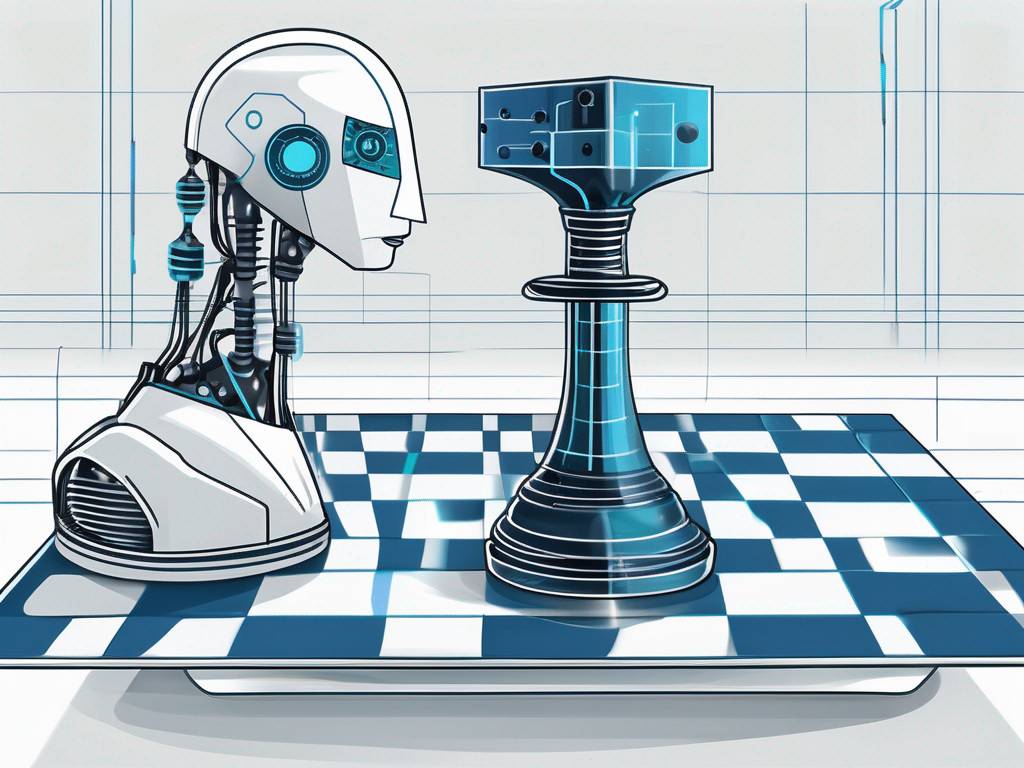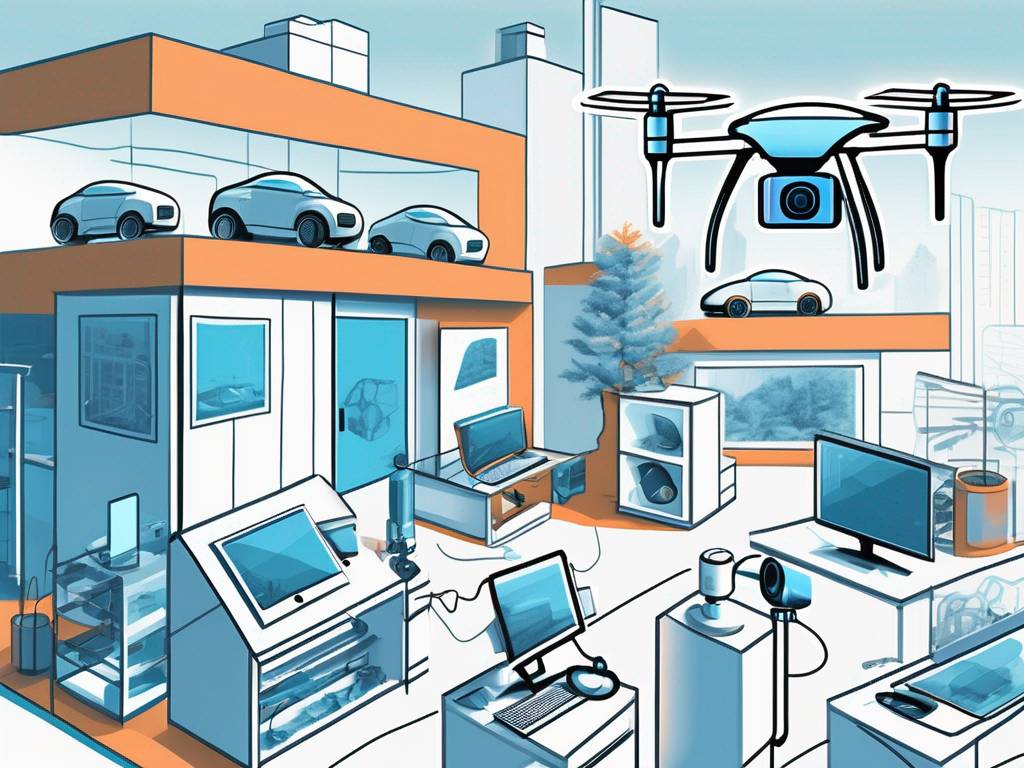Artificial Intelligence: Artificial Intelligence Explained
Artificial Intelligence (AI) is a multidisciplinary field of science that includes computer science, mathematics and statistics, psychology, and philosophy. It is a broad term that refers to machines or software that exhibit capabilities that mimic or replicate human intelligence. This can range from a simple computer program playing chess to a complex system that can process natural language and perform tasks that normally require human intelligence.
AI is a rapidly evolving field that has the potential to revolutionize many aspects of our lives and has applications in healthcare, education, transportation, and other industries. Despite its potential, AI also raises a number of ethical and societal issues that need to be addressed for successful adoption.
History of Artificial Intelligence
The concept of artificial intelligence can be traced back to ancient myths and stories about artificially created life or intelligence. These narratives, which have been part of human culture for centuries, have shaped how people conceptualize the idea of crafting intelligence through artificial means.
The modern field of AI research was founded at a conference at Dartmouth College in 1956, where the term “Artificial Intelligence” was coined. Since then, the field of AI has experienced several periods of optimism followed by disappointment, known as “AI winters.” Despite these setbacks, AI has made significant progress in recent years, driven by advances in machine learning and data analysis.
Early History of AI
The early history of AI is marked by the development of various theories and models of human cognition and intelligence. This includes the work of Alan Turing, who proposed the idea of a “universal machine” that could simulate the logic of any computer algorithm. This concept, known as the Turing machine, is considered a fundamental concept in computer science and the theoretical foundation of AI.
Other early AI research focused on developing programs that could mimic human problem-solving skills. This included the development of the Logic Theorist, considered the first artificial intelligence program, which was capable of proving mathematical theorems.
AI Winters & Revival
The term ‘hype cycle’ refers to a model that tracks the evolution of public excitement and adoption of a technology through five distinct phases: Technology Trigger, Peak of Inflated Expectations, Trough of Disillusionment, Slope of Enlightenment, and Plateau of Productivity. This model is commonly used to explain how AI technology is being adopted.
AI winters are periods marked by a significant decline in funding, interest, and advancements in artificial intelligence, aligning with the Trough of Disillusionment stage of the hype cycle. There have been two major AI winters
- The First AI Winter (1974-1980): Triggered by thigh expectations outstripping AI’s capabilities, particularly in understanding and reasoning with real-world knowledge.
- The Second AI Winter (1987-1993): Occurred after AI failed to meet the high expectations of the 1980s, especially in machine translation and expert systems, leading to reduced funding and interest from government and industry sources.
Despite these setbacks, AI experienced a revival in the late 1990s and early 2000s, driven by the success of practical applications such as data mining, industrial robotics, and voice recognition. The current era of AI, often referred to as the “AI spring” or the Slope of Enlightenment, is characterized by significant breakthroughs in AI capabilities, largely due to advancements in machine learning and big data.
Types of Artificial Intelligence
Artificial Intelligence is classified into two types: Narrow AI and General AI. Narrow AI encompasses systems such as Google’s search algorithms and Facebook’s image recognition systems. In contrast, General AI refers to machine intelligence that mirrors human intelligence in terms of understanding, reasoning, learning, and interacting with the environment. However, General AI remains theoretical and has not yet been realized.
Narrow AI
Narrow AI, also known as Weak AI, refers to AI systems that are designed to perform a specific task, such as language translation, spam filtering, or self-driving car technology. These systems operate under a limited set of constraints and are only capable of performing the tasks they are specifically designed for.
Generative AI is a type of Narrow AI that has gained popularity over the last decade. It is capable of generating new and original content, such as text, images, or music. Generative AI mimics the patterns in the data to create content that is similar yet distinct from its learning material.
Despite its limitations, Narrow AI has achieved significant success and is widely used across various industries. For example, recommendation systems employed by online retailers and streaming services utilize AI to analyze user behavior and deliver personalized recommendations. Similarly, voice recognition systems in virtual assistants like Siri and Alexa exemplify Narrow AI.
General AI
General AI, also known as Strong AI or artificial general intelligence (AGI), is currently a theoretical concept that involves creating machines capable of learning from data and applying this knowledge across various domains. Unlike Narrow AI, General AI would have the ability to understand, learn, and implement knowledge to a broad array of tasks without specific programming. AGI aims to replicate the full range of human intellect, including cognitive skills, emotional intelligence, and social interaction.
Despite significant advancements in AI research, General AI has not yet been realized. The pursuit of AGI presents substantial technical and ethical challenges, and its potential societal impact continues to be a topic of intense discussion.
Key Components of AI
AI encompasses a variety of technologies and components designed to enable machines to perform tasks that typically require human intelligence. Here’s an in-depth look at the key elements that form the backbone of AI:
- Machine Learning (ML): Machine learning is a crucial subset of AI that equips systems to autonomously learn from data without explicit programming. By identifying patterns and improving decision-making processes over time, ML minimizes the need for human intervention.
- Deep Learning: Deep learning, a more specialized branch of machine learning, employs multi-layered artificial neural networks to process large amounts of data. It is highly effective at recognizing complex patterns and enhancing decision-making capabilities, making it essential for advanced AI applications.
- Neural Networks: These sophisticated computational models are inspired by the structure of the human brain. By processing data through multiple layers of nodes (neurons), neural networks learn complex patterns and make predictions, contributing significantly to AI applications.
- Natural Language Processing (NLP): NLP is a specialized field of AI focused on enabling machines to comprehend and interpret human language. This technology underpins various applications such as chatbots, translation services, and sentiment analysis tools, facilitating seamless human-machine communication.
- Computer Vision: Computer vision allows machines to understand and interact with the visual world. Utilizing digital imagery from cameras and sensors, combined with deep learning techniques, computer vision systems can detect, classify, and react to visual stimuli, expanding AI’s applicability in real-world scenarios
Applications of Artificial Intelligence
AI in Education
AI has the potential to personalize learning and improve educational outcomes. AI can analyze student data to identify learning patterns and tailor instruction to individual needs. For example, AI-powered tutoring systems can provide personalized feedback and adapt instruction based on student performance.
AI can also automate administrative tasks, such as grading and scheduling, freeing up time for teachers to focus on instruction. In addition, AI can be used to develop interactive learning AI tools, such as virtual reality simulations, to enhance learning experiences.
AI in Retail
Leveraging AI in retail will enhance the industry in several ways, impacting both operational aspects and customer experiences. AI-powered recommendation engines are helping retailers increase sales by suggesting products that customers are likely to be interested in based on their browsing and purchase history. These recommendations can be displayed on the retailer’s website, in email newsletters, or through targeted advertisements. By providing customers with personalized recommendations, retailers can increase customer engagement, drive repeat purchases, and ultimately boost revenue.
AI systems can also be used to predict inventory requirements more accurately by analyzing sales data, trends, and external factors such as weather and economic conditions. This helps retailers reduce overstock and stockouts, leading to more efficient inventory management.
AI in Manufacturing
One of the key applications of AI in manufacturing is predictive maintenance. By leveraging data from IoT sensors installed in machinery and applying predictive modeling techniques, businesses can detect patterns that indicate potential equipment failures. This allows manufacturers to schedule maintenance proactively, minimizing unplanned downtime and reducing maintenance costs.
AI can also optimize production by analyzing data from various sources, such as sensors, supply chain systems, and customer demand forecasts, to identify bottlenecks, inefficiencies, and opportunities for improvement. This will ultimately help manufacturers optimize their operations, reduce waste, and increase productivity.
Additionally, AI-powered quality control systems are improving product quality and reducing defects. By analyzing data from sensors and cameras, AI algorithms can detect anomalies in real-time, allowing manufacturers to identify and address quality issues before they escalate. This not only improves customer satisfaction, but also reduces the risk of costly product recalls and warranty claims.
AI in Finance
One of the key applications of AI in finance is algorithmic trading. By analyzing market data, news feeds, and historical trading patterns, AI algorithms can make real-time trading decisions with speed and accuracy that surpass human capabilities. This not only improves trading performance but also reduces the risk of human errors and emotional biases. AI-powered trading systems can execute trades at the optimal time, take advantage of market inefficiencies, and react quickly to changing market conditions.
AI-powered chatbots and virtual assistants are transforming customer support in the financial industry. These AI systems can understand natural language queries, provide personalized financial advice, and assist customers with various transactions, such as balance inquiries, fund transfers, and loan applications. By automating routine customer interactions, AI-powered chatbots free up human agents to focus on more complex and high-value tasks, improving efficiency and customer satisfaction.
As AI continues to advance, its impact on various industries will only grow stronger. From banking to insurance, AI is reshaping the way businesses operate, driving innovation and unlocking new possibilities.
Challenges & Ethical Considerations in AI
Privacy & Bias in AI
AI systems often rely on large amounts of data, which can raise privacy concerns. For example, AI systems used in healthcare and education may have access to sensitive personal information. There are also concerns about the potential for AI to be used for surveillance and other invasive practices.
Bias in AI is another major concern. AI systems are trained on data, and if this data is biased, the AI system can also become biased. This can lead to unfair outcomes, such as discrimination in hiring or loan approval. Addressing bias in AI requires careful data collection and analysis, as well as transparency in AI algorithms.
Job Displacement & Autonomous Weapons
AI has the potential to automate many jobs, leading to job displacement. While AI can also create new jobs, there are concerns about the potential for increased inequality, as those with AI skills may benefit more than others. There are also concerns about the potential for AI to be used in autonomous weapons, which could change the nature of warfare and raise ethical issues.
Addressing these challenges requires careful regulation and policy-making. This includes policies to support workforce transition and retraining, as well as international agreements to regulate the use of AI in weapons. It also requires ongoing research and dialogue to understand the potential impacts of AI and develop strategies to mitigate any negative effects.
Future of Artificial Intelligence
The future of AI is a topic of intense debate and speculation. Some experts believe that AI will continue to advance and become an integral part of our lives, while others warn of potential risks and challenges. Regardless of the outcome, it is clear that AI will continue to have a significant impact on society and the economy.
As AI continues to evolve, it is important to ensure that it is developed and used in a way that benefits all of society. This requires ongoing research, policy-making, and public engagement. It also requires a commitment to ethical principles, such as fairness, transparency, and respect for human rights.
AI & Society
As AI becomes more integrated into our lives, it will have a significant impact on society. This includes changes in the job market, as AI automates certain tasks, as well as changes in our daily lives, as AI becomes more integrated into products and services. There are also potential impacts on social dynamics, as AI changes the way we communicate and interact with each other.
Understanding and managing these impacts requires a multidisciplinary approach, involving not only computer scientists but also sociologists, psychologists, and policymakers. It also requires public engagement and dialogue to ensure that the development and use of AI align with societal values and priorities.
AI & the Economy
AI has the potential to significantly impact the economy. On one hand, AI can increase productivity and economic growth by automating tasks and improving decision-making. On the other hand, AI can also lead to job displacement and increased inequality, as those with AI skills will benefit more than others.
Managing these impacts requires careful policy-making, including policies to support workforce transition and retraining, as well as policies to promote fair and inclusive economic growth. It also requires ongoing research to understand the economic impacts of AI and develop strategies to maximize its benefits and mitigate its risks.
Empower Your Business With WestLink’s AI Expertise
As the landscape of Artificial Intelligence continues to evolve, staying ahead in of your competitive is crucial. WestLink is at the forefront of crafting custom software solutions that harness the power of AI, machine learning, and big data to drive innovation and efficiency. With a track record of over 100 happy clients and a team of 75+ developers, we specialize in transforming complex challenges into award-winning solutions. Ready to unlock the full potential of AI for your business? Learn how WestLink can help you navigate the future of technology and propel your company forward.
Questions?
- What is Artificial Intelligence?Toggle questionArtificial Intelligence refers to the development of computer systems that can perform tasks that typically require human intelligence. These tasks include learning, reasoning, problem-solving, perception, and language understanding.
- What are the main types of AI?Toggle questionThere are two main types of AI: Narrow AI (or Weak AI) and General AI (or Strong AI). Narrow AI is designed to perform a specific task, while General AI is imagined to possesses the ability to understand, learn, and apply knowledge across various tasks, much like a human. It is important to note that General AI does not yet exist and is a theoretical concept at this time.
- What are some real-world applications of AI?Toggle questionAI finds applications in diverse fields, including healthcare (diagnosis and treatment planning), finance (fraud detection), autonomous vehicles, natural language processing (chatbots, language translation), and recommendation systems in ecommerce.
- How does machine learning relate to AI?Toggle questionMachine learning is a subset of AI that focuses on developing algorithms that enable systems to learn and improve from experience. It allows machines to analyze data, identify patterns, and make decisions without explicit programming.
- How can businesses leverage AI?Toggle questionBusinesses can use AI for various purposes, such as improving customer experiences through chatbots, optimizing operations with predictive analytics, personalizing marketing strategies, and enhancing decision-making through data analysis.

 hello@westlink.com
hello@westlink.com  (866) 954-6533
(866) 954-6533  700 N Colorado Blvd,
700 N Colorado Blvd,







Comments